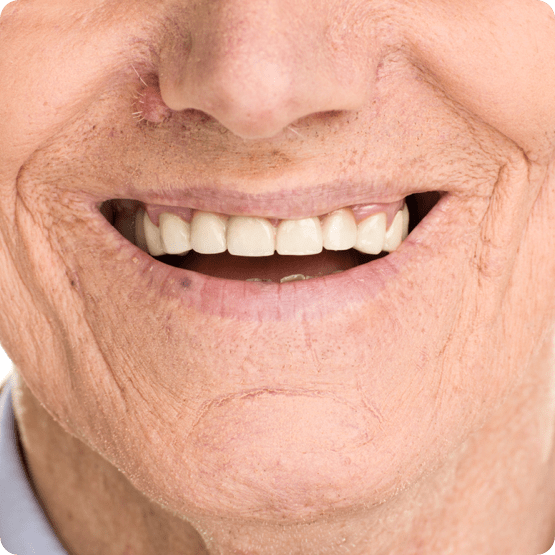Denture Repairs & Relines in Ottawa

Same-day Repairs and Relines
There are numerous advantages to dentures, from increased self-confidence to enhanced functionality, but one other benefit is that they don’t always need to be replaced if they are broken, worn, or no longer fit as they used to. Dentures can be repaired and touched up when they need to be, allowing patients to continue wearing their dentures without the cost of a complete replacement. Whether your denture is loose, broken in half, has broken tooth, or a partial denture needs a tooth added to it Ottawa South Denture Clinic is here to bring your denture to it’s previous glory.
At Ottawa South Denture Clinic, we have a wide array of options available to our clients, including rebasing, relining, and repairing your denture. Additionally, when the contours of your mouth have changed dramatically, we offer soft liners to Ottawa patients who no longer able to wear their dentures comfortably. Soft liners provide comfort to patients with flat gums that no longer tolerate dentures, suffer from chronic soreness, and who have prominent bony areas that make wearing dentures deeply uncomfortable. Most repairs and relines can be done in 1 day. Emergency repairs are done in 1-2 hours.

How Often Are Repairs / Relines Needed?
Patients often ask us how often their dentures will need to be repaired or relined. In general, it’s a good practice to reline dentures every 2-3 years. This is a rough guideline, and the relining timeline can vary from patient to patient, wear and tear, etc. Repairs can become necessitated from time to time, and unfortunately, it’s not wholly predictable as to when or how often a repair need could arise. The best way to avoid the need for denture repairs is to take proper care of your dentures. As much as we have a passion for denture repair and take pride in the denture repair work at Ottawa South Denture Clinic, our primary concern is the well being and satisfaction of our patients. That’s why we encourage you to clean your dentures religiously, avoid staining and abnormal wear and tear.Frequently Asked Questions
What are some signs your dentures need repair?
- Broken, chipped, or cracked dentures
Despite our best efforts, sometimes dentures chip, crack, or break. When dentures suffer these problems, they can be unusable, or can irritate the soft tissue in your mouth. It is important to repair or replace your dentures so that problems do not get worse. - Discomfort in your mouth
If you feel uneven pressure on your gums, a sore jaw, oral sores, or loose dentures, you should get your dentures repaired right away. If you experience sharp pain on or near your canine teeth, especially while biting, you should visit your denturist right away as it might be a sign of bone reabsorption. - Difficulty chewing
One of the main reasons to get dentures is to get back to your normal eating habits. While you will need time to adjust to your new dentures, if chewing becomes increasingly uncomfortable you should visit your denturist to refit them. - Gum irritation/Oral Sores
While wearing dentures might feel a bit strange at first, they should never cause gum irritation. If you experience raw spots, inflammation, or bleeding when you wear your dentures, you should visit your denturist right away to get them fixed. - Changes in facial shape
Your dentures play a big role in keeping your face and cheeks looking full and even. If you notice a change in your jawline appearance, you likely need to have your dentures repaired or adjusted.
If you are experiencing issues with your dentures, Contact us today! We can help.
What are the most common causes of broken dentures?
No matter how well we care for our dentures, sometimes they wear down and break. The most common causes of broken dentures are:
- Wear and tear
Dentures undergo stress every day as we use them. Eventually, no matter how well made they are, they will break. - Gum tissue and jawbone changes
As your jawbone changes, your dentures will not fit like they used to. This can cause stress on your dentures, leading to wear and tear and breakage. - Bone loss
Bone loss occurs in many people, especially as they age. If you experience jaw bone loss, your dentures will move around your mouth and potentially cause cracks and breaks - Accidents
Sometimes accidents happen. Dentures can be dropped, stepped on, or otherwise damaged and need repair
If you have broken dentures, contact us to get them fixed.
Can I make small repairs to my dentures myself?
As a general rule, we do not recommend you make repairs to your dentures yourself, even if they are small. When not done by a professional, these small repairs can cause much larger and more expensive problems down the line. If you suspect that your dentures need repair, contact us and our experts will help you make the repairs you need.
How long does a denture reline last?
Denture relines are not permanent for a number of reasons. First off, your bones and gums change over the years, leading to dentures which no longer fit as well as they once did. Hard relines typically need to be redone every two years, sometimes lasting up to four years. If your bone changes are substantial or your teeth become too worn, it might be time to get a new denture. If you suspect it is time for a new reline, contact us today.
What is a denture reline?
A denture reline is a procedure to reshape the underside of a denture in order to keep them secure and comfortable in your mouth. Denture relines are important because as you age, the shape of your jawbone and gums change. No pair of dentures, no matter how well made, will always fit and relines will be necessary. Depending on your specific needs, there are two types of relines.
- Hard Reline
A hard reline should be done at least every two years. Hard relines ensure that your replacement teeth fit comfortably without needing an entirely new fitting. During a reline process, your denturist will remove some of the plastic from inside your dentures, and replace it with putty where your dentures make contact with your gums. The putty will make an impression, and after hardening will be replaced by acrylic so that your dentures fit your mouth perfectly. - Soft Reline
A soft reline is similar to a hard reline, with a few small differences. Soft relines are typically done when patients can no longer wear their dentures due to soreness in the mouth. Soft relines are also recommended for people wearing dentures for the first time, as well as for those experiencing bone reabsorption. During a soft reline, a liquid polymer is added into the denture to give it more depth and cushion. This makes wearing the dentures more comfortable, and is softer on tissue which can get tender due to pressure. If you need a denture reline, contact us today.
How can you avoid the need for denture repairs?
With proper denture care and maintenance. With proper attention to oral hygiene and denture upkeep, you can ensure that your dentures will last longer. Daily brushing with a soft-bristled toothbrush, using non-abrasive toothpaste, and soaking your dentures in solution every night can help avoid unnecessary trips to your denture clinic to get your dentures repaired.
Will a denture repair job affect the lifespan of my dentures?
As a set of dentures typically last for at least 5 to 10 years, it’s likely that you’ll need to get your dentures repaired or relined at some point. If your dentures are repaired properly and professionally, it will only add to the longevity of your dentures. However, if you opt for DIY repair techniques and kits, it may compromise the integrity and longevity of your dentures.
Can all damaged or broken dentures be repaired?
It depends on the extent of the damage. While most dentures problems and breaks can be repaired, there are instances in which you should consider replacing your dentures altogether. Consult with a denturist to evaluate whether your dentures are worth trying to repair or not.
What should I do if my dentures break?
In the case of broken or damaged dentures, use the following tips:
- Call your denturist as soon as possible to schedule a denture repair appointment
- If you have a set of spare dentures, start using them in the meantime
- Avoid trying any DIY short-term denture repair techniques by yourself
100% Happiness Guaranteed
Our #1 priority here at Ottawa South Denture Clinic is your happiness! Which means we stand by our service 100%,
no matter what, no questions asked, no ifs, no ands, no buts.

We combine an outstanding patient care, the latest denture technologies and welcoming atmosphere to create the ultimate denture experience for you.

We will restore your beautiful smile, improve your oral health and help you regain your confidence.

We are leaders in the field of Complete and Partial Dentures. We specialize in state-of-the-art Suction Dentures technique, Implant Dentures, Repairs and Relines.

We are so confident you would love our services, we provide 100% Happiness Guarantee.

Aiming to Repair Dentures Rather Than Replace
While a complete replacement is necessary from time to time, we are often able to perform the repairs needed without having to replace your denture. When we rebase your dentures, we retrofit them by replacing the acrylic denture base with new acrylic, which acts as a stabilizing force when the dentures are in your mouth. With a reline, we add new base material to the tissue side of a denture, so it fits properly. We take an impression of the inside of your denture and ensure it properly conforms to the tissue on the inside of your mouth. While it doesn’t impact the appearance of the dentures, it does improve the fit.
In most cases, our denturist is capable of repairing a broken or cracked denture. Repairs might be needed for a variety of reasons, from chipping to adding new teeth to existing denture. Normal wear and tear also plays a role in the deterioration of your dentures. Most repairs are done in a day.

How Often Are Repairs / Relines Needed?
Patients often ask us how often their dentures will need to be repaired or relined. In general, it’s a good practice to reline dentures every 2-3 years. This is a rough guideline, and the relining timeline can vary from patient to patient, wear and tear, etc. Repairs can become necessitated from time to time, and unfortunately, it’s not wholly predictable as to when or how often a repair need could arise. The best way to avoid the need for denture repairs is to take proper care of your dentures. As much as we have a passion for denture repair and take pride in the denture repair work at Ottawa South Denture Clinic, our primary concern is the well being and satisfaction of our patients. That’s why we encourage you to clean your dentures religiously, avoid staining and abnormal wear and tear.Frequently Asked Questions
What are some signs your dentures need repair?
- Broken, chipped, or cracked dentures
Despite our best efforts, sometimes dentures chip, crack, or break. When dentures suffer these problems, they can be unusable, or can irritate the soft tissue in your mouth. It is important to repair or replace your dentures so that problems do not get worse. - Discomfort in your mouth
If you feel uneven pressure on your gums, a sore jaw, oral sores, or loose dentures, you should get your dentures repaired right away. If you experience sharp pain on or near your canine teeth, especially while biting, you should visit your denturist right away as it might be a sign of bone reabsorption. - Difficulty chewing
One of the main reasons to get dentures is to get back to your normal eating habits. While you will need time to adjust to your new dentures, if chewing becomes increasingly uncomfortable you should visit your denturist to refit them. - Gum irritation/Oral Sores
While wearing dentures might feel a bit strange at first, they should never cause gum irritation. If you experience raw spots, inflammation, or bleeding when you wear your dentures, you should visit your denturist right away to get them fixed. - Changes in facial shape
Your dentures play a big role in keeping your face and cheeks looking full and even. If you notice a change in your jawline appearance, you likely need to have your dentures repaired or adjusted.
If you are experiencing issues with your dentures, Contact us today! We can help.
What are the most common causes of broken dentures?
No matter how well we care for our dentures, sometimes they wear down and break. The most common causes of broken dentures are:
- Wear and tear
Dentures undergo stress every day as we use them. Eventually, no matter how well made they are, they will break. - Gum tissue and jawbone changes
As your jawbone changes, your dentures will not fit like they used to. This can cause stress on your dentures, leading to wear and tear and breakage. - Bone loss
Bone loss occurs in many people, especially as they age. If you experience jaw bone loss, your dentures will move around your mouth and potentially cause cracks and breaks - Accidents
Sometimes accidents happen. Dentures can be dropped, stepped on, or otherwise damaged and need repair
If you have broken dentures, contact us to get them fixed.
Can I make small repairs to my dentures myself?
As a general rule, we do not recommend you make repairs to your dentures yourself, even if they are small. When not done by a professional, these small repairs can cause much larger and more expensive problems down the line. If you suspect that your dentures need repair, contact us and our experts will help you make the repairs you need.
How long does a denture reline last?
Denture relines are not permanent for a number of reasons. First off, your bones and gums change over the years, leading to dentures which no longer fit as well as they once did. Hard relines typically need to be redone every two years, sometimes lasting up to four years. If your bone changes are substantial or your teeth become too worn, it might be time to get a new denture. If you suspect it is time for a new reline, contact us today.
What is a denture reline?
A denture reline is a procedure to reshape the underside of a denture in order to keep them secure and comfortable in your mouth. Denture relines are important because as you age, the shape of your jawbone and gums change. No pair of dentures, no matter how well made, will always fit and relines will be necessary. Depending on your specific needs, there are two types of relines.
- Hard Reline
A hard reline should be done at least every two years. Hard relines ensure that your replacement teeth fit comfortably without needing an entirely new fitting. During a reline process, your denturist will remove some of the plastic from inside your dentures, and replace it with putty where your dentures make contact with your gums. The putty will make an impression, and after hardening will be replaced by acrylic so that your dentures fit your mouth perfectly. - Soft Reline
A soft reline is similar to a hard reline, with a few small differences. Soft relines are typically done when patients can no longer wear their dentures due to soreness in the mouth. Soft relines are also recommended for people wearing dentures for the first time, as well as for those experiencing bone reabsorption. During a soft reline, a liquid polymer is added into the denture to give it more depth and cushion. This makes wearing the dentures more comfortable, and is softer on tissue which can get tender due to pressure. If you need a denture reline, contact us today.
How can you avoid the need for denture repairs?
With proper denture care and maintenance. With proper attention to oral hygiene and denture upkeep, you can ensure that your dentures will last longer. Daily brushing with a soft-bristled toothbrush, using non-abrasive toothpaste, and soaking your dentures in solution every night can help avoid unnecessary trips to your denture clinic to get your dentures repaired.
Will a denture repair job affect the lifespan of my dentures?
As a set of dentures typically last for at least 5 to 10 years, it’s likely that you’ll need to get your dentures repaired or relined at some point. If your dentures are repaired properly and professionally, it will only add to the longevity of your dentures. However, if you opt for DIY repair techniques and kits, it may compromise the integrity and longevity of your dentures.
Can all damaged or broken dentures be repaired?
It depends on the extent of the damage. While most dentures problems and breaks can be repaired, there are instances in which you should consider replacing your dentures altogether. Consult with a denturist to evaluate whether your dentures are worth trying to repair or not.
What should I do if my dentures break?
In the case of broken or damaged dentures, use the following tips:
- Call your denturist as soon as possible to schedule a denture repair appointment
- If you have a set of spare dentures, start using them in the meantime
- Avoid trying any DIY short-term denture repair techniques by yourself







 2210 Prince of Wales Drive, Unit 701, Nepean, ON K2E 6Z9
2210 Prince of Wales Drive, Unit 701, Nepean, ON K2E 6Z9 Free Parking and Wheelchair Accessible
Free Parking and Wheelchair Accessible Hours of Operation
Hours of Operation